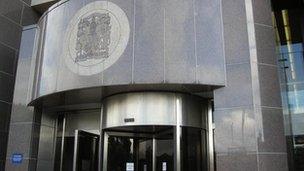Flexibility call over Legal Aid
- Published

Contributions are currently collected for civil cases but not criminal
The Scottish government has been urged to consider if its proposed changes to criminal legal aid can be improved.
Ministers have put forward legislation that would mean people with a disposal income of 拢68 a week or more would pay a financial contribution.
They believe the measure could save 拢3.9m a year from the legal aid budget.
Holyrood's Justice Committee said the scheme should be flexible enough to take into account a person's full circumstances.
The Scottish government has said about 80% of people receiving legal aid would continue to pay nothing and that the Bill would end a situation where contributions are collected for civil cases but not for criminal cases.
Justice Secretary Kenny MacAskill has stated that it is "right and proper that those who can afford to pay towards the cost of their legal defence costs do so".
'Sufficiently flexible'
MSPs on the committee backed in principle the proposals in the Scottish Civil Justice Council and Criminal Legal Assistance Bill.
They said they are "not opposed in principle" to people contributing towards their criminal legal aid.
But they stressed that such a system "must be proportionate to the means of the individual and be sufficiently flexible to take into account particular personal circumstances".
In their report the MSPs said it is "important that there should be no incremental movement towards an ever wider category of people falling within the contributory net".
They also pointed out that in civil cases people could recover their expenses if they are successful, and urged Mr MacAskill to look at whether people could recoup criminal legal aid contributions if they are acquitted.
Committee convener Christine Grahame said: "While the Justice Committee supports the general principles of the Bill, we have made a number of recommendations we expect the Scottish government to consider carefully to improve this proposed legislation."
The Law Society of Scotland has already raised concerns about part of the Bill which would mean solicitors having to collect the contributions themselves, arguing that this would turn them into "unpaid debt collectors".
'Collection systems'
The society said the Scottish Legal Aid Board is the "obvious body" for collecting such money.
The committee of MSPs stated that while there are "significant resource implications" in requiring the board to do this, it would be "better placed to maintain and enforce collection systems".
Ms Graham said the committee "would like more information on the income threshold for contributing towards criminal legal aid".
She said: "We would also like the government to take another look at the possibility of allowing acquitted persons to recoup legal aid contributions under certain circumstances and at their current proposals to require solicitors to recover contributions themselves."
As well as the changes to criminal legal aid, the Bill aims to establish a Scottish Civil Justice Council to replace both the Court of Session Rules Council and Sheriff Court Rules Council.
The new body would have a policy role to advise and make recommendations on improving the civil justice system.
The committee said it is satisfied that the powers the new council would have "appear overall to be appropriate" and would give the organisation "sufficient flexibility to carry out its role".
A Scottish government spokeswoman said it was grateful for the committee's "careful consideration" of the Bill.
She added: "The committee has asked us to consider some matters which have arisen during the Bill's parliamentary passage so far. We will look closely at these issues and respond to the committee in due course."